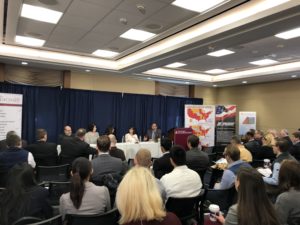PSM Went to Congress to Share Our Concerns About The Threat of Counterfeit Medicine

Picture from the House of Representatives Briefing 2019
On Thursday, January 31, 2019, The Partnership for Safe Medicines (PSM) held briefings for the U.S. House of Representatives and the U.S. Senate in Washington, D.C. to highlight the dangers counterfeit medicines pose to American citizens. Over the course of each three-panel event, congressional staffers learned about the impact that counterfeit medicines have had on individuals and on our local, state, and federal law enforcement officers, and learned about the role of international drug cartels and bad actors in the production and distribution of fake medicine. PSM Board Member Dr. Kenneth McCall opened each briefing, thanking the 22 different partner organizations who worked with PSM to make these briefings possible and announcing that PSM has now found counterfeit fentanyl pills documented in 46 states, with deaths in 29.
Family members who had lost a loved one to counterfeit medicine and a living victim of counterfeit drugs made up the first panel. Carrie Luther spoke about the devastating loss of her son Tosh, who died after taking just part of a counterfeit Xanax pill that contained fentanyl. Caroline and Kristin DiVita spoke about their sister Maggie’s death and the successful prosecution of the Vero Beach, Florida doctor who made the fake fentanyl pill that killed her. Rick Roberts shared an emotional story of receiving two different counterfeit versions of the same medication. That experience has left him diligently checking any prescriptions he picks up from a pharmacy.
In the second panel, local, state, and federal law enforcement members focused on the impact that counterfeit medicines have had on their work. Keith Cain, Daviess County, Kentucky Sheriff and National Sheriffs’ Association Board Member, said, “Law enforcement officers from sheriff’s offices and police departments encounter these fake fentanyl-laced opioids everywhere; we see them at traffic stops, we see them certainly on drug busts, we see them at domestic violence calls… They pose a risk to public health. They make a very difficult, very dangerous job that much more burdensome.” U.S. Drug Enforcement Administration (DEA) Deputy Assistant Administrator Keith Brown said that drug cartels are “motivated by greed” and that they can make more money by manufacturing fake medicines because more people use prescription drugs than illicit drugs. Daniel Salter, Executive Director, Atlanta-Carolinas High-Intensity Drug Trafficking Areas, warned that: “These are not chemists manufacturing these pills. They are idiots in a garage stamping this stuff together.”
The final panel focused on the international scope of the counterfeit drugs trade. Aaron Graham of Boehringer-Ingelheim Pharmaceuticals, who moderated this panel, offered up a shocking statistic from the World Customs Organization: counterfeit prescription medicines is a $200 billion underground economy. Former Canadian Border Patrol agent Don Bell informed the attendees that “a [Canadian] legitimate brick-and-mortar pharmacy or any pharmacists cannot fill a prescription written by an American doctor. It has to be written by a Canadian doctor.” He also said that Health Canada does not inspect drugs being transshipped through their country for patients in other countries. PSM Board Member Samuel J. Louis, a former U.S. Assistant District Attorney for the Southern District of Texas, discussed several of his past counterfeit medicine cases. Louis recounted a conversation with notorious drug counterfeiter Kevin Xu, who—after law enforcement managed to lure him to the U.S.—said, about cancer drugs, “They won’t ever know because these people are going to die anyway.”
Retired DEA agents Steve Murphy and Javier Peña also shared their perspectives, having each spent years working to bring down international drug cartels. Peña warned that traffickers already have established distribution routes to get counterfeit medicines into the U.S. Murphy said that for drug traffickers making counterfeit medicines, “It’s all about making a buck at the expense of innocent people.” Graham closed out the final panel by highlighting how cartels are preying on patients and how dangerous it is members for the public to blindly trust purchasing medications from a website just because it has a Canadian flag on it.
PSM Board President Dr. Marv Shepherd closed out the meeting, again thanking our 22 briefing partners. Dr. Shepherd stressed that it would be nearly impossible to guarantee the safety and effectiveness of imported pharmaceuticals. A video from the House of Representatives briefing is available on C-SPAN.